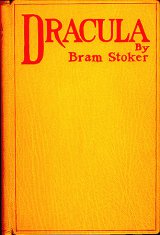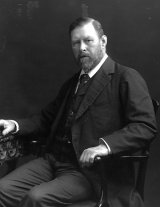Dracula Page #2
Dracula is an 1897 Gothic horror novel by Irish author Bram Stoker. It introduced Count Dracula, and established many conventions of subsequent vampire fantasy. The novel tells the story of Dracula's attempt to move from Transylvania to England so that he may find new blood and spread the undead curse, and of the battle between Dracula and a small group of men and a woman led by Professor Abraham Van Helsing.
will enjoy your stay in my beautiful land. "Your friend, "DRACULA." 4 May.--I found that my landlord had got a letter from the Count, directing him to secure the best place on the coach for me; but on making inquiries as to details he seemed somewhat reticent, and pretended that he could not understand my German. This could not be true, because up to then he had understood it perfectly; at least, he answered my questions exactly as if he did. He and his wife, the old lady who had received me, looked at each other in a frightened sort of way. He mumbled out that the money had been sent in a letter, and that was all he knew. When I asked him if he knew Count Dracula, and could tell me anything of his castle, both he and his wife crossed themselves, and, saying that they knew nothing at all, simply refused to speak further. It was so near the time of starting that I had no time to ask any one else, for it was all very mysterious and not by any means comforting. Just before I was leaving, the old lady came up to my room and said in a very hysterical way: "Must you go? Oh! young Herr, must you go?" She was in such an excited state that she seemed to have lost her grip of what German she knew, and mixed it all up with some other language which I did not know at all. I was just able to follow her by asking many questions. When I told her that I must go at once, and that I was engaged on important business, she asked again: "Do you know what day it is?" I answered that it was the fourth of May. She shook her head as she said again: "Oh, yes! I know that! I know that, but do you know what day it is?" On my saying that I did not understand, she went on: "It is the eve of St. George's Day. Do you not know that to-night, when the clock strikes midnight, all the evil things in the world will have full sway? Do you know where you are going, and what you are going to?" She was in such evident distress that I tried to comfort her, but without effect. Finally she went down on her knees and implored me not to go; at least to wait a day or two before starting. It was all very ridiculous but I did not feel comfortable. However, there was business to be done, and I could allow nothing to interfere with it. I therefore tried to raise her up, and said, as gravely as I could, that I thanked her, but my duty was imperative, and that I must go. She then rose and dried her eyes, and taking a crucifix from her neck offered it to me. I did not know what to do, for, as an English Churchman, I have been taught to regard such things as in some measure idolatrous, and yet it seemed so ungracious to refuse an old lady meaning so well and in such a state of mind. She saw, I suppose, the doubt in my face, for she put the rosary round my neck, and said, "For your mother's sake," and went out of the room. I am writing up this part of the diary whilst I am waiting for the coach, which is, of course, late; and the crucifix is still round my neck. Whether it is the old lady's fear, or the many ghostly traditions of this place, or the crucifix itself, I do not know, but I am not feeling nearly as easy in my mind as usual. If this book should ever reach Mina before I do, let it bring my good-bye. Here comes the coach! * * * * * 5 May. The Castle.--The grey of the morning has passed, and the sun is high over the distant horizon, which seems jagged, whether with trees or hills I know not, for it is so far off that big things and little are mixed. I am not sleepy, and, as I am not to be called till I awake, naturally I write till sleep comes. There are many odd things to put down, and, lest who reads them may fancy that I dined too well before I left Bistritz, let me put down my dinner exactly. I dined on what they called "robber steak"--bits of bacon, onion, and beef, seasoned with red pepper, and strung on sticks and roasted over the fire, in the simple style of the London cat's meat! The wine was Golden Mediasch, which produces a queer sting on the tongue, which is, however, not disagreeable. I had only a couple of glasses of this, and nothing else. When I got on the coach the driver had not taken his seat, and I saw him talking with the landlady. They were evidently talking of me, for every now and then they looked at me, and some of the people who were sitting on the bench outside the door--which they call by a name meaning "word-bearer"--came and listened, and then looked at me, most of them pityingly. I could hear a lot of words often repeated, queer words, for there were many nationalities in the crowd; so I quietly got my polyglot dictionary from my bag and looked them out. I must say they were not cheering to me, for amongst them were "Ordog"--Satan, "pokol"--hell, "stregoica"--witch, "vrolok" and "vlkoslak"--both of which mean the same thing, one being Slovak and the other Servian for something that is either were-wolf or vampire. (Mem., I must ask the Count about these superstitions) When we started, the crowd round the inn door, which had by this time swelled to a considerable size, all made the sign of the cross and pointed two fingers towards me. With some difficulty I got a fellow-passenger to tell me what they meant; he would not answer at first, but on learning that I was English, he explained that it was a charm or guard against the evil eye. This was not very pleasant for me, just starting for an unknown place to meet an unknown man; but every one seemed so kind-hearted, and so sorrowful, and so sympathetic that I could not but be touched. I shall never forget the last glimpse which I had of the inn-yard and its crowd of picturesque figures, all crossing themselves, as they stood round the wide archway, with its background of rich foliage of oleander and orange trees in green tubs clustered in the centre of the yard. Then our driver, whose wide linen drawers covered the whole front of the box-seat--"gotza" they call them--cracked his big whip over his four small horses, which ran abreast, and we set off on our journey. I soon lost sight and recollection of ghostly fears in the beauty of the scene as we drove along, although had I known the language, or rather languages, which my fellow-passengers were speaking, I might not have been able to throw them off so easily. Before us lay a green sloping land full of forests and woods, with here and there steep hills, crowned with clumps of trees or with farmhouses, the blank gable end to the road. There was everywhere a bewildering mass of fruit blossom--apple, plum, pear, cherry; and as we drove by I could see the green grass under the trees spangled with the fallen petals. In and out amongst these green hills of what they call here the "Mittel Land" ran the road, losing itself as it swept round the grassy curve, or was shut out by the straggling ends of pine woods, which here and there ran down the hillsides like tongues of flame. The road was rugged, but still we seemed to fly over it with a feverish haste. I could not understand then what the haste meant, but the driver was evidently bent on losing no time in reaching Borgo Prund. I was told that this road is in summertime excellent, but that it had not yet been put in order after the winter snows. In this respect it is different from the general run of roads in the Carpathians, for it is an old tradition that they are not to be kept in too good order. Of old the Hospadars would not repair them, lest the Turk should think that they were preparing to bring in foreign troops, and so hasten the war which was always really at loading point.
Translation
Translate and read this book in other languages:
Select another language:
- - Select -
- 简体中文 (Chinese - Simplified)
- 繁體中文 (Chinese - Traditional)
- Español (Spanish)
- Esperanto (Esperanto)
- 日本語 (Japanese)
- Português (Portuguese)
- Deutsch (German)
- العربية (Arabic)
- Français (French)
- Русский (Russian)
- ಕನ್ನಡ (Kannada)
- 한국어 (Korean)
- עברית (Hebrew)
- Gaeilge (Irish)
- Українська (Ukrainian)
- اردو (Urdu)
- Magyar (Hungarian)
- मानक हिन्दी (Hindi)
- Indonesia (Indonesian)
- Italiano (Italian)
- தமிழ் (Tamil)
- Türkçe (Turkish)
- తెలుగు (Telugu)
- ภาษาไทย (Thai)
- Tiếng Việt (Vietnamese)
- Čeština (Czech)
- Polski (Polish)
- Bahasa Indonesia (Indonesian)
- Românește (Romanian)
- Nederlands (Dutch)
- Ελληνικά (Greek)
- Latinum (Latin)
- Svenska (Swedish)
- Dansk (Danish)
- Suomi (Finnish)
- فارسی (Persian)
- ייִדיש (Yiddish)
- հայերեն (Armenian)
- Norsk (Norwegian)
- English (English)
Citation
Use the citation below to add this book to your bibliography:
Style:MLAChicagoAPA
"Dracula Books." Literature.com. STANDS4 LLC, 2025. Web. 22 Feb. 2025. <https://www.literature.com/book/dracula_10>.








Discuss this Dracula book with the community:
Report Comment
We're doing our best to make sure our content is useful, accurate and safe.
If by any chance you spot an inappropriate comment while navigating through our website please use this form to let us know, and we'll take care of it shortly.
Attachment
You need to be logged in to favorite.
Log In